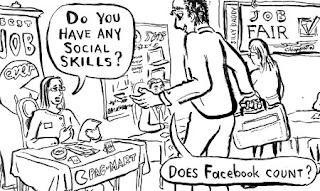Everything happens in balance, you have to give something to get something. In the case of communication technology, we trade in our social skills in order to have conversations with anybody around the world at the drop of a dime. Like any skill that goes unpracticed, social skills deteriorate as people talk face-to-face on fewer occasions. In many forms of communication technology, such as texting and instant messaging, it is almost impossible to use sarcasm and other humorous communication through screens because often times the person on the other side will misinterpret what is being said. It is also tough to stress a point because the tone and intensity of what the person is saying is usually only expressible through punctuation, which also happens to have multiple meanings.
Children who are growing up in the technology-based community we have implemented are the most affected by the epidemic of not being able to hold a conversation. According to an article published by the Huffington Post, “actual conversation is becoming a thing of the past”(1). By "actual conversation," the author of this article means that there is no longer any connection between two individuals who are communicating because they are using screens as a medium of transmission. In the article, Melissa Ortega, a child psychologist at New York’s Child Mind Institute, notes that high school students “check their phones constantly” and suggests that the students check their phones so often as an “avoidance strategy.” Ortega also notices that the students “don’t know how to handle conflict face to face” and have issues in “small talk situations”(1). These are some of the signs that our social skills are degrading at a rapid rate. If we use our phones as a crutch because we are uncomfortable when it comes to small talk, we have a major problem. Small talk is one of the main ways that individuals have connected with others. The article also suggests that because of the incorporation of the internet into our daily lives, there are attention deficits that are being formed. Information is being shoved so rapidly into our brains that we hare having issues with patience and paying attention.



